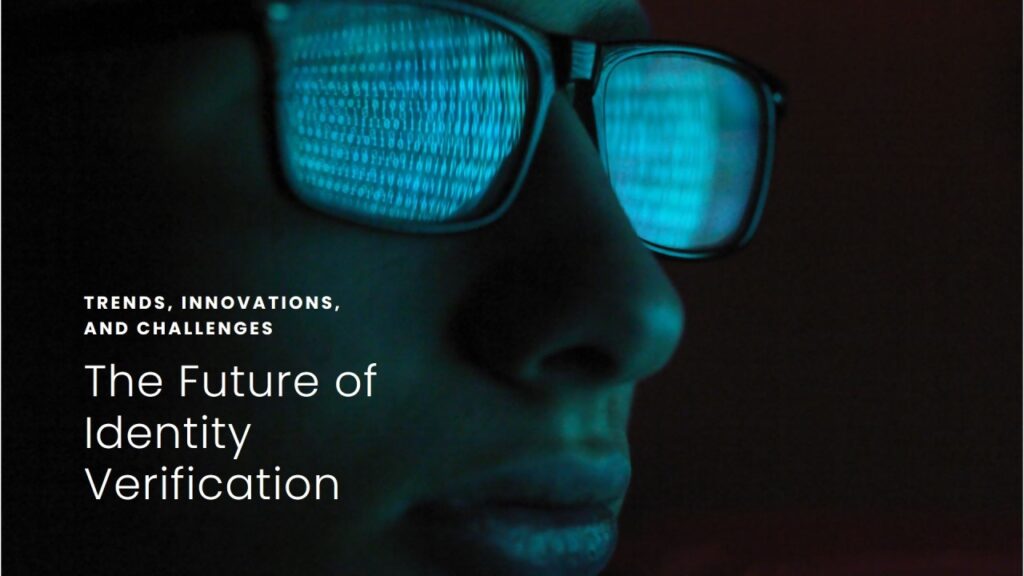In an increasingly digital world, the future of identity verification is set to play a pivotal role in how we interact with technology, conduct business, and secure our personal information. As more services move online and as fraud and cyber threats become more sophisticated, the need for robust, secure, and seamless identity verification methods has never been more critical. But what will the future of identity verification look like, and how will emerging technologies shape the way we verify who we are?
Let’s explore the major trends, innovations, and challenges that are defining the future of identity verification.
1. Biometrics Will Dominate the Landscape
One of the most significant shifts in identity verification is the growing reliance on biometrics. Biometric authentication methods such as fingerprint scanning, facial recognition, voice recognition, and even iris or vein pattern scanning are becoming more common in everyday applications.
Unlike passwords or documents, biometrics are inherently linked to an individual, making them much harder to forge or steal. They offer both enhanced security and convenience, allowing users to unlock devices, make payments, or access sensitive information with just a glance or a touch.
The integration of AI and machine learning will make biometric systems even more accurate, reducing errors and the potential for identity fraud. We may also see more advanced forms of biometrics, such as behavioral biometrics, which analyse how users type, swipe, or use their devices to verify their identities.
2. Decentralised Identity and Blockchain Technology
As concerns around privacy and data ownership grow, decentralised identity (or self-sovereign identity) is emerging as a powerful solution. The idea is simple: instead of your personal data being stored by multiple companies or governments, you hold and control your identity, deciding when and with whom to share it.
Blockchain technology underpins decentralised identity by creating secure, tamper-proof records. Each individual’s identity is stored as a unique digital credential on the blockchain, accessible only by them, but verifiable by others without the need for centralised control. This reduces the risks associated with large-scale data breaches, where centralised databases containing millions of identities are compromised.
Decentralised identity systems could be used for anything from logging into social media accounts to proving citizenship, accessing financial services, or even voting online. As this model matures, individuals will gain greater control over their personal data, reducing the reliance on centralised, vulnerable systems.
3. AI-Powered Identity Verification
The use of artificial intelligence (AI) is transforming identity verification by making it faster, smarter, and more secure. Machine learning algorithms can analyse vast amounts of data in real-time to detect anomalies, flag suspicious behavior, and confirm identities with a high degree of accuracy.
AI systems can cross-reference data from multiple sources—such as social media profiles, device information, and geolocation data— to verify identities and spot potential fraud in real-time. This is particularly useful in industries like banking or online retail, where quick decisions are critical to preventing fraud without disrupting the customer experience.
AI-powered facial recognition systems, combined with liveness detection technologies, can verify that a user is a real person and not a photo or video spoofing attempt. These technologies are already being used in online banking, government services, and even airport security, and they will only become more prevalent in the future.
4. Passwordless Authentication
Passwords have long been the weak link in digital security, often easy to guess, hack, or steal. The future of identity verification lies in passwordless authentication, where users rely on biometrics, hardware tokens, or other secure methods to log in without the need for a traditional password.
Many systems already support passwordless logins through methods such as one-time passcodes (sent via SMS or email), multi-factor authentication (MFA), or biometric verification. The goal is to eliminate the need for passwords entirely, reducing the risk of breaches and making the login process much smoother for users.
An important development in this space is the FIDO2 authentication standard, which aims to provide strong, passwordless authentication using public-key cryptography. Major companies like Google, Microsoft, and Apple are adopting these standards, paving the way for a future where passwords become obsolete.
5. Digital Identity for the Metaverse
As the metaverse becomes more real, with virtual worlds, augmented reality (AR), and mixed-reality experiences taking off, identity verification in these spaces will become increasingly important. Users in the metaverse will need ways to prove their identity in both virtual and real-world interactions, whether for making purchases, accessing services, or building trust with other users.
Digital identities will play a critical role in ensuring that avatars, actions, and assets in the metaverse are securely tied to real individuals. Virtual ID cards or blockchain-based identity systems could allow users to move seamlessly between different digital environments while maintaining a verifiable identity.
The metaverse presents new challenges for identity verification. Unlike traditional digital interactions, where we are verifying real-world identities, the metaverse involves users who may have multiple virtual identities. Ensuring authenticity and preventing identity fraud in these dynamic environments will require innovative verification systems tailored to the unique needs of virtual worlds.
6. Regulatory Pressures and Global Standards
As digital interactions increase, so do regulatory demands for stronger identity verification. Governments worldwide are tightening rules around Know Your Customer (KYC), Anti-Money Laundering (AML), and General Data Protection Regulation (GDPR), forcing businesses to adopt stricter identity verification protocols.
The future will likely see more unified, global standards for identity verification to ensure cross-border security and privacy. Interoperability between different identity verification systems will be key, allowing users to verify their identity across multiple platforms and services while maintaining control of their data.
The balance between security and user privacy will remain a significant challenge. While more stringent verification processes will help curb fraud and cybercrime, they must be designed in a way that respects users’ privacy and avoids over-surveillance.
The Road Ahead: Seamless and Secure Verification
The future of identity verification promises to be both more secure and seamless. As the world becomes more digital and interconnected, the need for trust in our identities will only grow. Innovations in biometrics, AI, blockchain, and decentralised systems will lead to a world where verifying who we are is not just a matter of security, but a seamless part of our daily interactions—whether in the real world or the virtual one.
However, with these advancements come significant challenges: protecting privacy, ensuring accessibility, and navigating complex regulatory landscapes. As we move forward, the success of identity verification technologies will depend on how well they balance these factors, ensuring a safer, more connected future for everyone.
Idenfo is uniquely positioned to excel in the future of identity verification by leveraging its cutting-edge technology and deep expertise in risk management, compliance, and identity solutions. With a focus on integrating biometrics and AI-driven fraud prevention, Idenfo provides secure, scalable, and user-friendly solutions that meet the demands of an increasingly digital world.
Our commitment to innovation ensures that we stay ahead of regulatory requirements while offering seamless verification processes, making us a trusted partner for businesses seeking to enhance security without compromising on user experience.









